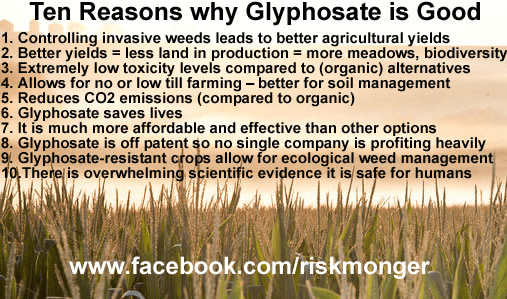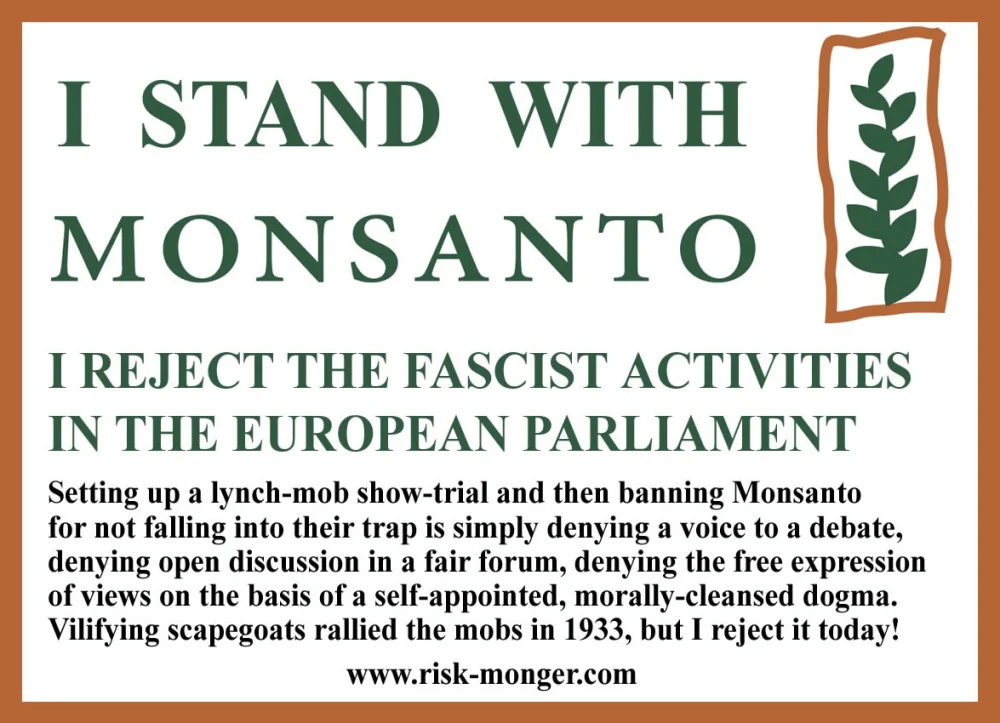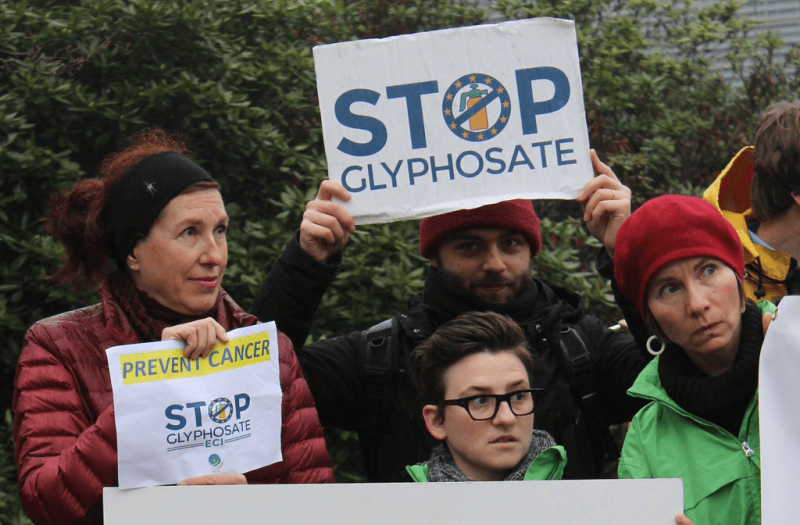With 25 years of experience in the Brussels trenches, it was not supposed to be this way … nor this easy.
On this dreary November afternoon, as fuming activists are huddled inside cafés around the Place Luxembourg planning out the next steps in their anti-agriculture assault, we should use the calm to conduct an ex-post evaluation on what has just transpired. How did the anti-chemical NGOs and their #StopGlyphosate campaign so badly screw things up.
Some history

For more than a decade, the Risk-Monger has been trying to get the Brussels Bubble to understand the strengths and importance of glyphosate for sustainable agriculture. He has often felt alone in an unfriendly arena. He has been called a lot of names, had a site shut down, was roughed up a few times and attacked as a Monsanto shill.
So today is a good day, not for me as much as for farmers and the environment. With security of access to herbicides like glyphosate, more farmers will invest in the drilling equipment to adopt no-till practices or dabble in more complex cover-crop species. Livestock farmers from Italy to Denmark will be able to import soy and maize feed without the risk of shipments refused at ports for having traces of a banned EU substance. Farmers will have one less uncertainty to worry about.

Today though, I wasn’t celebrating. My reflection was on what happened six years ago. At the time of the first reauthorisation fight, the activist groups were behaving despicably, insulting anyone who spoke out (calling them Monsanto shills), attacking the agencies who did not follow their science, trying to control the narrative by marching in scientists who were bought and paid for by US tort law firms seeking billions in lawsuits from Monsanto… Journalists, like the two Stéphanes at Le Monde, were freely campaigning with activist NGOs and attacking any other journalist who did not promote their dystopian narrative. Regulators were bullied, events disrupted and democracy denied by anti-chemical campaign zealots. The lowest point was when a group of activists organised a hearing in the European Parliament to attack Monsanto, and when the company managers decided, wisely, to not attend, the MEPs then voted to block access to any officials from Monsanto.
With a band of disgraceful thugs writing their own rules and deciding what could or could not be said, I didn’t think then that things could get any worse in Brussels … that was until this last year when the glyphysteria reached epic proportions. The puerile disrespect of the activist mob this time around, however, was not directed at some evil corporation, but was landing against European regulators. At a recent European Parliament show-trial staged against EFSA and ECHA, when Pesticide Action Network’s chief scientist, Peter Clausing, scowled that the European Chemicals Agency was “lying”, I started to have a feeling that the herbicide just might be reauthorised.
You don’t behave disgracefully and expect sympathy or compromise in return. But rather than humility and reflection in their defeat, the NGOs are likely going to lash out even more.
Preparing for the great tantrum
Of course, six years ago after the last PAFF Committee vote, there was hell to pay when the NGOs lost and glyphosate was reauthorised. The rogue German agriculture minister needed police protection, had to shut his twitter account and was soon after shown the door. Even the Risk-Monger lost a teaching post when a sulking Olivier De Schutter needed someone to lash out against. De Schutter then tried to take the European Commission to court but this was only to save face while the NGOs prepared for Glyphosate 2.0. Five years is not a long time in the EU policy process so the campaign continued, with more funding, more alliances, more outrage.
This time though, ten years means that the Glyphosate Activist Complex will have to find something else to do. There is an enormous amount of money, power and influence in the anti-chemicals, anti-agriculture lobby so I don’t expect the NGOs to sit back and lick their wounds. How will they react in the coming weeks and months?
First the relentless campaigners will try to stop the European Commission from carrying out their reauthorisation. They have several weeks before glyphosate is officially reauthorised so expect a flurry of communications campaigns, emails and, of course, donation requests. Their tone will be angry and insulting but in the last year it has become obvious that activists have no respect for government regulators (and I suspect the feeling is mutual).
Next, the activists will challenge the legal basis for the reauthorisation. European environmental NGOs are no longer sandal-wearing tree-huggers. Groups like ClientEarth are lawyered up to the gills and exist simply to clog European courts with regulatory retaliation. But unlike the US, the European courts move at a glacial pace and while they can use the interval to raise money and offer their followers hope, they won’t get any favourable outcome in the next six to seven years, if at all.
Finally the activists will take their anti-glyphosate campaigns to the Member States and Regions. While they will be able to crow over their success when some market-town in North Brabant declares itself herbicide-free, few farming communities will willingly give their neighbouring regions agricultural advantages. Luxembourg or Austria might take the Sri Lanka North approach, but such wins are little consolation and will likely continue to be overturned in the courts.
I think the activists should take a moment to stop the fight and analyse how they screwed up something that was a sure thing. The renewal of the glyphosate reauthorisation was theirs to lose, so how did they lose so badly?
Where did the NGOs fail?
There are many reasons for this colossal campaign failure but will the activists have the humility to be self-critical? It wasn’t because of industry lobbying or some EFSA conspiracy… the StopGlyphosate campaign lost due to its own inner weakness. Here are some reasons why I feel the activists messed up and easy win.
Lack of dialogue
For the last ten years, the anti-ag-tech NGOs have promoted their ideal agricultural dogma without engaging with a variety of farmers, agronomists or other food stakeholders. Their solutions and understanding are limited to those in their silos so it should come as no surprise that other stakeholders did not embrace them. I attended several #StopGlyphosate events in the European Parliament and found that I was the only one who was not a committed anti-chemicals activist. At the same time, the activists did not attend industry-driven events to share their views in a participatory environment. I am often blocked from events and social media pages not because I am rude or threatening but because my views are not welcome. Ignorance thrives when the windows are shut.
Kool-Aid poisoning
When you only listen to those who agree with you and continue to convince yourself that those who disagree have hidden agendas, then you can start to believe and promote some really stupid things. I coined the term “glyphysteria” when I saw how a simple, low-toxicity herbicide was being blamed for everything from neurological disorders, cancers, bee declines to COVID and autism. People, it is just a herbicide. Activist scientists were getting funding to try to prove glyphosate was polluting our air and rainwater and with properly calibrated lab equipment, they could prove that anything is not impossible. The deluge of fear-mongering that campaigners unleashed on a scientifically illiterate community was disgraceful. So when the key European scientific bodies, EFSA and ECHA, found no concern with the herbicide, the only possible conclusion was that the regulators were lying.
Lack of compromise
If you are paid by foundations and philanthropists to deliver a policy win, then a compromise is as good as a loss. If you are a dogmatic ideologue, then compromise is unthinkable. If you surround yourself with people who confirm your bias, then compromise is illogical. But what if NGOs had come to the table to compromise on glyphosate? Six years ago, French President, Emmanuel Macron, consoled his defeated troops by declaring that France would replace glyphosate within three years. Activists insisted: Ban the substance now! What if the campaigners had agreed and worked to find feasible alternatives or develop a transition timetable? This year, PAN Europe received funding from the European Green Party to produce a document to argue that alternatives to glyphosate exist (but most of the alternatives were old, worse for the environment or impractical). Now they have ten years to work on a transition but the campaigners will likely remain intransigent.
Excessive contempt
There is a certain arrogance exuded by activists that blocks their ability to listen, compromise or consider alternative views. I can say that here because I am sure that none of the anti-glyphosate campaigners would have a mind open enough to read this far into any article they disagree with. They have a vile contempt for anyone who does not agree with them or buy into their dogma. Like my sister-in-law, Rachel, every conversation becomes a competition. While regulators in a participatory policy process have to listen to the campaigners, they don’t have to agree with them or follow their diktats.
Perhaps more humility, compromise, openness and receptiveness would help the activist cause. Perhaps they should do an honest ex-post evaluation of where they went wrong. Otherwise further failures will be their lot.
Today was a good day. If activists take the time to learn from their loss and change their tactics, tomorrow might be better.
David Zaruk is a Belgian-based environmental-health risk policy analyst specializing in the role of science in policy and societal issues. He blogs under the pseudonym: The Risk-Monger. Follow him on X at @zaruk
A version of this article was originally posted at The Risk- Monger and has been reposted here with permission. Any reposting should credit the original author and provide links to both the GLP and the original article.































